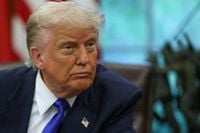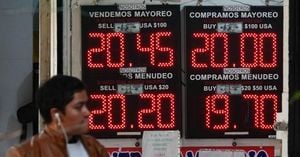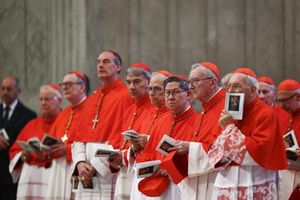In recent months, Brazilian researchers in the United States have expressed growing fears and uncertainties due to the shifting political landscape under President Donald Trump. Many of these academics, who have moved to the U.S. for their studies and research, are now grappling with the implications of budget cuts, changing policies, and an environment that seems increasingly hostile to their work and presence.
Josué M., a social sciences graduate student who arrived in the U.S. in 2023 during Joe Biden's administration, has witnessed firsthand the stark changes that began with Trump's return to power in January 2025. "We live daily with this negative energy that hangs over university towns. We're in an environment full of uncertainty," he shared. Josué's concerns are not unfounded; since the start of 2025, significant budget cuts have been proposed, particularly affecting research funding. For instance, the National Institutes of Health (NIH) is facing a proposed 40% budget reduction starting in 2026.
These cuts have already had tangible effects. Josué noted that two research grants he applied for were abruptly terminated mid-selection. Fellow researcher Diego F., who is pursuing a post-doctorate in law, lamented, "It’s as if they’re throwing years of academic research in the trash for political interests. That’s very worrying." This sentiment is echoed by many in the academic community, who feel that their work is being undermined by political agendas.
Further complicating matters, Harvard University recently faced a freeze of $2.3 billion in funds from the Department of Education after refusing to comply with Trump's demands, which included monitoring activities deemed anti-Semitic and curtailing diversity programs. This has raised alarms about the future of academic freedom and the integrity of research in the U.S. Higher education institutions have begun to voice their concerns, with a letter signed by representatives from 150 colleges denouncing what they describe as unprecedented government interference.
Moreover, the impact of these political changes is being felt particularly acutely in programs aimed at promoting diversity, equality, and inclusion. Carla D., a researcher in biotechnology, pointed out that all mechanisms encouraging diversity within her institution ceased to exist since January. "This impacts the arrival of new international students, including those from Brazil," she explained. Fellow researcher Cícero J., who is studying media and communication, echoed these concerns, noting that universities are reconsidering the value of admitting international students due to fears of sudden policy changes that could jeopardize their status.
As the political climate grows more contentious, researchers have reported a rising trend of self-censorship. Diego F. mentioned that certain terms related to diversity, social justice, and environmental issues are now viewed with suspicion. "It’s impossible not to see how this affects the academic environment and puts researchers in the crosshairs. The criteria are political and do not take science into account," he said. Josué added that informal recommendations have circulated among researchers to avoid using specific keywords that could lead to project rejections.
In February 2025, reports from major outlets like the Washington Post and New York Times revealed lists of words that have been effectively banned from government agencies, a move that many academics see as an attempt to stifle open discourse and research. The implications of this censorship extend beyond mere vocabulary; they threaten the very foundation of academic inquiry.
The atmosphere of fear is compounded by rumors of increased scrutiny on international students. A report from The Guardian noted that at least 40 foreign students have lost their visas due to minor infractions, creating an environment of anxiety where even small mistakes could lead to severe consequences. Josué recounted the pervasive sense of dread among his peers, stating, "We’re bombarded constantly with emails about how to act, what to do... It’s a terrible situation."
Luiza A., a history graduate student currently in the U.S. for an academic project, expressed her own fears about the uncertainty surrounding her visa status. "The constant threat of losing my visa leaves everyone adrift. There are no protocols, and common academic processes have become sources of great anxiety and uncertainty," she reflected.
As these researchers navigate the challenges posed by the current political climate, they also worry about the long-term implications for the U.S. academic system. Josué articulated a sense of disillusionment, stating, "I’ve seen many people come here and bet everything on this country. They are now extremely disappointed and sad because they thought they would build a career here, only to see those possibilities become increasingly restricted."
Ultimately, many Brazilian researchers are contemplating their future in the U.S. Given the current environment, some are even considering returning to Brazil, where they feel their rights and academic freedoms would be better protected. As Carla D. put it, "The loss of prestige for American academic institutions is already underway. A graduate student today may prefer to go to Europe instead of the U.S. for their studies."
In light of these developments, the Brazilian academic community in the U.S. remains on edge, caught between their aspirations for research and the harsh realities of a shifting political landscape. The future of academic inquiry hangs in the balance, as these scholars grapple with the challenges of conducting their work in an increasingly hostile environment.




